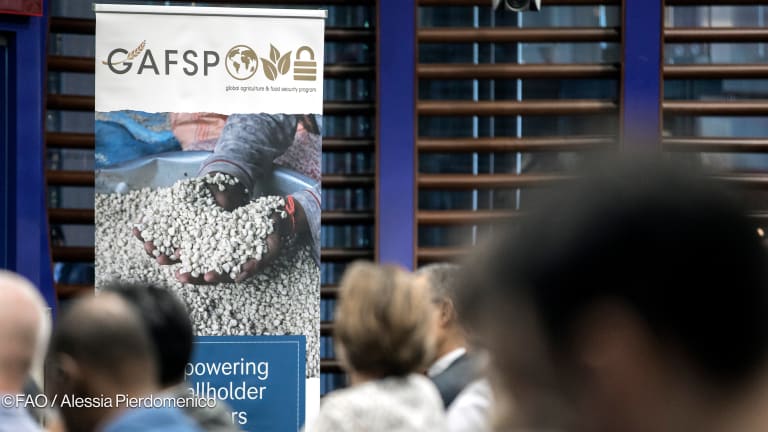GEF eyes grander impact as it heads towards replenishment
As the Global Environment Facility geared up to continue its replenishment negotiations in Brazil last week, Devex learns about its priorities for the coming cycle.
BONN, Germany — The Global Environment Facility, a financial mechanism for five major international environment conventions, will focus on achieving systems-wide change and private sector engagement under its new replenishment cycle starting later this year, its director of programs has shared with Devex. Negotiations on the seventh GEF Trust Fund replenishment, or GEF-7, which covers the period 2018-2022, will continue at a meeting in Brasilia this week, and culminate in June. Participants include donors, recipient countries, and implementing agencies such as the World Bank, U.N. Development Programme, Conservation International and U.N. Environment Programme. Priorities for the next four-year cycle of the GEF — a partnership of 18 agencies working with 183 governments — include the launch of a series of cross-cutting “Impact Programs,” which come as part of a drive to deliver clearer benefits at a systems-wide scale following poor performance on the issue in previous years. The programs aim to enhance sectoral and thematic integration and leverage the private sector during GEF-7. “Move-the-needle” programs Established at the time of the 1992 Rio Earth Summit, the GEF partnership provides grants and mobilizes financing for projects tackling environmental problems. But a review of interventions undertaken during the fifth replenishment cycle of 2010-2014 found that just 20 percent of the GEF’s projects were delivering benefits at a systems-wide scale, and improving on this has been one of the top priorities of Naoko Ishii, chief executive officer and chairperson of the facility since 2012. “The facility’s projects, too often fragmented and isolated, have come up short in shifting the needle in the right direction, let alone in bringing about transformational change,” Ishii noted ahead of the second replenishment meeting in Ethiopia in October. “The GEF can play a catalytic role for much-needed transformational change in food and land use systems,” she added while speaking at the Global Landscapes Forum in Bonn, Germany, in December. “If we break out of man-made institutional silos and create multistakeholder platforms at large-scale landscapes, we have a higher chance to succeed.” The proposed Impact Programs cover food systems, land use and restoration, sustainable cities, and sustainable forest management, and each of them is intended to deliver benefits across GEF’s focus areas. For example, where past Sustainable Forest Management investments “were isolated and only focused on integrating SFM principles at the project scale,” according to a technical document prepared by the GEF Secretariat ahead of this week’s meeting in Brazil, the new SFM Impact Program is targeting a bigger, cross-cutting effect — maintaining “the integrity of entire biomes by concentrating efforts, focus and investments, as well as ensuring strong regional cross-border coordination.” Speaking to Devex at the Global Landscapes Forum, the organization’s director of programs, Gustavo Fonseca, said it “is in promising discussions with its donors towards the allocation of significant funding” for programs that will support the sustainable management of landscapes at scale. The GEF’s work on sustainable cities, for instance, will encompass climate change mitigation and food production: “We will avoid creating new silos by categorizing interventions into rural versus urban, because these issues are clearly interlinked,” Fonseca told Devex. The ultimate goal is to promote change in key economic systems in line with countries’ national development priorities, according to the technical document. The GEF intends to become “more focused to more strategically deploy resources where it can support the transformation of key systems that drive environmental degradation, so that impacts can be maximized,” it explains. Private sector engagement The facility says the proposed Impact Programs offer “significant opportunities for crowding-in the private sector,” and seeks to bring it in at an early stage of the design process. Currently, private sector investments account for only 16 percent of co-financing across GEF’s portfolio. Among the barriers to private sector investment in GEF projects, the technical document identifies a lack of interest among countries in involving the private sector in projects already supported by the GEF; and a lack of entry points for private sector stakeholders to engage across the entire value chain in a coordinated manner. In response, the GEF is putting forward a two-pillar strategy: Accelerating the use of nongrant instruments for blended finance — especially in the area of natural resources management — and working with the private sector to transform markets. Over the past four years, it successfully piloted a nongrant instrument that “brings private sector players on board by de-risking their investment through guarantees and equity,” explained Fonseca. The initiative resulted in 11 innovative projects that included $99.5 million of GEF funding and $1.8 billion in private sector co-financing. Under GEF-7, the facility intends to further pursue this line of work, and to “create and participate in platforms where several constraints in conservation finance, such as small size, lack of capacity, and perceived risks are collectively addressed and attract private investments to natural resource management at scale,” according to the replenishment meeting document. A goal of the GEF “is to create and participate in platforms where several constraints in conservation finance, such as small size, lack of capacity, and perceived risks are collectively addressed and attract private investments to natural resource management at scale,” says the facility in the replenishment meeting document. To boost future investments, the GEF is considering measures such as raising its project size cap and creating an advisory group of financial experts to engage in project reviews. The GEF may also call on additional experts to advise on specific types of nongrant instruments, and pinpoint potential investment categories where innovation may be needed, such as chemicals and waste, agroforestry and sustainable fisheries. Read more Devex coverage on environment.
BONN, Germany — The Global Environment Facility, a financial mechanism for five major international environment conventions, will focus on achieving systems-wide change and private sector engagement under its new replenishment cycle starting later this year, its director of programs has shared with Devex.
Negotiations on the seventh GEF Trust Fund replenishment, or GEF-7, which covers the period 2018-2022, will continue at a meeting in Brasilia this week, and culminate in June. Participants include donors, recipient countries, and implementing agencies such as the World Bank, U.N. Development Programme, Conservation International and U.N. Environment Programme.
Priorities for the next four-year cycle of the GEF — a partnership of 18 agencies working with 183 governments — include the launch of a series of cross-cutting “Impact Programs,” which come as part of a drive to deliver clearer benefits at a systems-wide scale following poor performance on the issue in previous years.
This story is forDevex Promembers
Unlock this story now with a 15-day free trial of Devex Pro.
With a Devex Pro subscription you'll get access to deeper analysis and exclusive insights from our reporters and analysts.
Start my free trialRequest a group subscription Printing articles to share with others is a breach of our terms and conditions and copyright policy. Please use the sharing options on the left side of the article. Devex Pro members may share up to 10 articles per month using the Pro share tool ( ).
Gloria Pallares is a journalist reporting on sustainable development, global health and
humanitarian aid from Africa and Europe. Her work has appeared in a range of publications
including El Pais, Forbes, CIFOR’s Forest News and the leading media outlets in Spain via the
multimedia newswire Europa Press.








